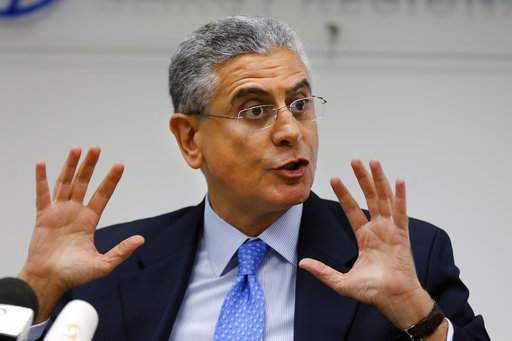
By BASSEM MROUE
BEIRUT , Lebanon— A senior World Bank official said Tuesday that the Lebanese economy is “not doing great” and urged the country’s leaders to approve some $1.1 billion worth of projects put forward by the international lender, saying otherwise they could be cancelled.
Ferid Belhaj, the bank’s vice president for the Middle East and North Africa, told reporters in Beirut that the economy is “in a state of fragility.”
Lebanon’s economy has suffered from the seven-year civil war in neighboring Syria, which has caused occasional spillovers of violence and has sent more than 1 million refugees across the border. Syrian refugees now make up about a quarter of Lebanon’s population.
The refugees’ presence has been a burden on Lebanon’s already crumbling infrastructure. Power outages are common, and many residents must have water brought to their homes by tanker truck.
Belhaj said Lebanon should take steps to reform the electricity sector, where the state-owned provider operates on a $1.5 billion annual deficit.
Corruption-plagued Lebanon has one of the highest debt ratios in the world, worth $80 billion, or 152 percent of the gross domestic product, and growth has been slow since 2011.
Belhaj said the World Bank has a portfolio of more than $2 billion of projects in Lebanon, including about $1.1 billion which is still “not converted into actual investment, meaning they are sitting with parliament and the council of ministers.”
He said the World Bank wants to make sure that projects move forward, not only because Lebanon needs them, but because the government is paying commitment fees on them. He said that if the projects are not approved by the government and parliament they will have to be canceled.
“This is not our preference, obviously. We would really want to have these projects move ahead as soon as possible,” he said.
Saroj Kumar Jha, the World Bank’s regional director for the Mashreq, or Middle East, said the projects include improving roads in rural areas, building rapid bus transit across Beirut and improving the electricity sector.
Prime Minister-designate Saad Hariri has been trying to form a Cabinet since after the May 6 parliamentary elections, with no success due to political bickering.
Also Tuesday, Lebanese media reported that Iraqi intelligence in collaboration with the Lebanese General Security have revealed a scam network spreading false information to blackmail a number of Lebanese banks, including one of the country’s largest.
Investigations were continuing, and the head of Lebanon’s General Security, Abbas Ibrahim, told reporters in Beirut the plot was to undermine Lebanon’s banking sectors, one of the country’s economic pillars.
Iraqi intelligence has reportedly arrested some members of the network, who had falsely claimed they had accounts in Lebanese banks worth millions of dollars.
AP

Leave a Reply
You must be logged in to post a comment.